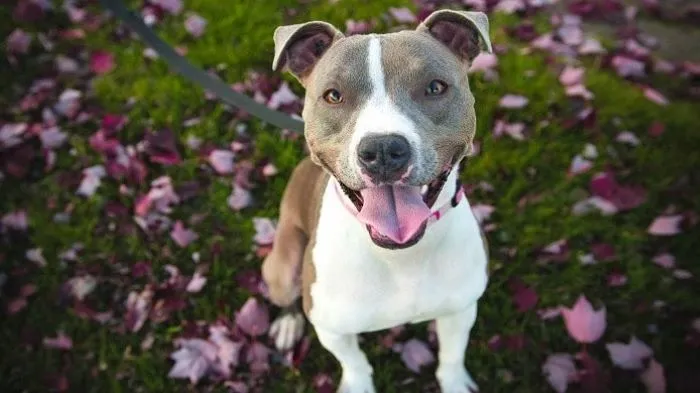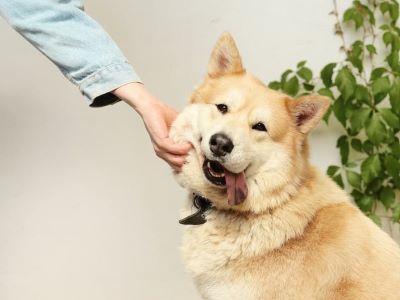Have you ever had those hiccups that just won’t stop? You know, the ones that make you reach for a glass of water if it holds the secret to stopping the hiccups. But what about your dogs, can dogs get hiccups? 🐶🐾
But don’t worry you are not alone, here we are exploring the curious world of dog hiccups, we will explore factors behind hiccups and what can we do about them.

Can Dogs Get Hiccups?
Yes dogs can get hiccups. Hiccups are common in mammals so dogs have them too! Dog hiccups can be caused by various factors such as eating quickly, getting overly excited, over-exertion from playing, stress and anxiety. Here are some potential causes of hiccups:
“The hiccups involve an involuntary action involving a reflex, Once triggered the reflex causes a strong contraction of the diaphragm followed about a quarter of a second later by closure of vocal cords, resulting in a ‘hic’ sound”, confirms Dr Katie Grzyb from PetMD.
Overeating or Rapid Eating
Imagine you devoured your food in seconds now your tummy may feel a bit funny, right? Well, the same thing can happen to dogs also. When eating too much too quickly, they may get hiccups. So whenever you them gobbling down their food, try to slow them down.

You may also use a special bowl or plate, That is designed to make them eat slower, or just give them smaller portions more often.
When dogs eat too fast and quickly they swallow down a lot of air too. This air can tickle their tummy and cause those funny hiccups. Imagine you drank a whole glass of soda in one big sip, you may get the hiccups too. To help them, make them drink anything slowly”, say the experts at AKG.
Excitement, Stress, or Anxiety
When we are super excited or a little nervous, we feel funny in our belly. It’s the same for dogs, they can get hiccups because of excitement, stress, or anxiety. It’s their way of saying, “Hey human, I am feeling overwhelmed!”.
To help them you may make the environment a little more calm and comfortable. You may spend time with them, and make sure they feel safe.

Gastrointestinal Issues
Dogs can experience hiccups due to gastrointestinal issues or irritation. If this is combined with other symptoms like changes in their poop, and changes in eating patterns then it may be worth checking with a vet[1]. Vets can figure out the issue and give special diets or medications like gaviscon for dogs that can help relieve the hiccups and keep their tummy happy.
Cold Temperature Exposure
Cold weather situations can cause tension in your dog’s diaphragm which results in hiccups. Some of the signs are if your dog shivers has dry skin, breathes slowly, and is unwilling to move, make sure they are in a warm place.
You can do this by providing a warm blanket or bed for your dog to sleep on, and also by keeping your home at a comfortable temperature.

Age and Developmental Stage
Puppies tend to get hiccups more often. It’s like growing bodies are learning how to work, and sometimes they hiccup along the way[2]. As they get older, hiccups may become less frequent. So usually, you don’t need to worry.
Breeds Biased
Certain dog breeds may be more prone to getting hiccups than others. Smaller breeds, especially toy breeds, seem to experience hiccups more frequently compared to larger breeds. This could be because of their smaller bodies.
If you have a cute little Chihuahua or a tiny pomeranian may get more hiccups. Hiccups in dogs are not a big concern, they go away on their own.
Sensitivity
Just like people, dogs have their unique sensitivities, and this sometimes can lead to hiccups. Some dogs may be more sensitive to things like sudden noises, excitement, or changes in their environment. They get triggered, which can lead to hiccups sometimes.
Some pet owners have questioned whether sensitivity issues in dogs may be connected to can dogs be autistic. However, more studies are needed to explore this potential link.
Vets suggest that dog hiccups are not harmful and usually resolve on their own within minutes or hours.
How to Handle Dog Hiccups?
We explored the factors behind hiccups, and now here are some tips to look after your dogs:
- Monitoring the Frequency and Duration: Occasional hiccups go away quickly, but if they persist it may be worth paying attention.
- Providing Water or a Small Meal: Offering a small drink or small meal can help too. Any potential irritation in their stomach or throat may go away that might be causing hiccups.

- Calming Techniques: Dogs may get nervous or excited, leading to hiccups. Try gentle massages and calming tips such as Spending time and playing around.
- Consulting a Vet: While hiccups are normally harmless but if they are accompanied by other symptoms or signs of distress, it’s a good idea to consult a vet. They can provide the right guidance.
Differentiating Hiccups From Other Conditions
Hiccups in dogs are caused by a spasm in the diaphragm muscle, which causes the glottis, the opening between the vocal cords, to close abruptly. There are various reasons like eating or drinking too quickly, getting overly excited, or gastric problems.
It is important to distinguish between hiccups and coughing or sneezing. A cough is a reaction from some irritants or foreign particles in the airway. Sneezing is stimulated by irritation of the nasal cavity.
Some common signs of illness in dogs include changes in energy level, sudden changes in daily habits, changes in urine, and still or frequency of these processes. If you notice any of these signs in your dog, you should contact your vet and seek professional guidance for diagnosis.
FAQs
Why Does My Dog Get Hiccups at Night?
Dog hiccups are thought to be caused when a dog swallows too much air. This can happen when dogs eat or drink quickly, experience stress, engage in heavy play, become excited, and/or inhale something irritating or caustic. Severe anxiety or rapid breathing can also cause contractions in a dog’s diaphragm.
What Do Dog Hiccups Sound Like?
Dog hiccups cause a distinctive “hic” sound that is usually accompanied by a diaphragm spasm. Dog hiccup symptoms include this sound and spasm combination, and are occasionally accompanied by a burp. Or, you may just see the spasm and not hear anything.
Should I Be Worried if My Dog Is Hiccuping?
Does it have any underlying conditions that may be a cause for concern? Most of the time, dog hiccups are perfectly normal and will resolve themselves in a few minutes. However, once the hiccups start to last for hours and begin to affect your dog’s quality of life, you should consider taking your fur baby to the vet.
Can Warm Cause Hiccups in Dogs?
Sometimes, regularly having hiccups or having hiccups that go on for a long time can be a sign of worms. If your puppy does have worms, it’s unlikely they’d just have hiccups but would have other effects as well, such as vomiting, diarrhoea (possibly with blood or worms in it), a swollen tummy or tiredness.
Why Does My Dog Get Hiccups in the Morning?
Mainly, the source of hiccups in dogs is spasms in their diaphragm. This can be caused by eating too fast, excitement, irritants as well as stress. In general, puppies hiccup in the morning after waking up, after eating, after naps, or after too much excitement.
Summary
And this brings us to the end of our exploration into the world of dog hiccups! Hiccups are little surprise that adds to their adorable character.
Most of the time they are not a problem but as responsible pet parents if you find anything abnormal you may consult with the vet. Meanwhile, enjoy those furry cuddles!🐾🐶
Reference:
- Quiroga, J. B., García, J. U., & Guedes, J. B. (2016). Hiccups: a common problem with some unusual causes and cures. British Journal of General Practice, 66(652), 584–586- NIH.
- Colgate. (2022a). Can dogs actually get hiccups?- Hill’s Pet Nutrition.



